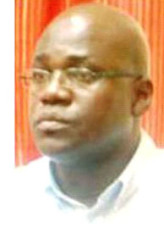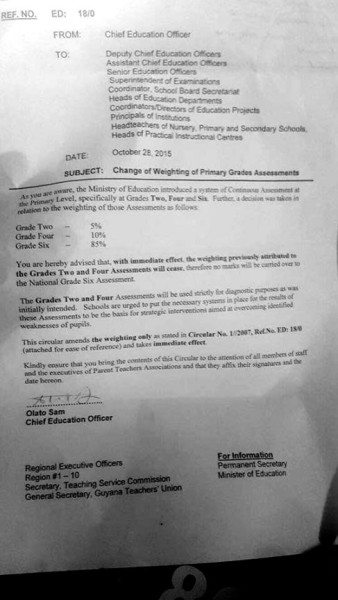Students writing the National Grade Six Assessment (NGSA) next year will have their secondary school placement decided on the strength of those scores alone.
This is according to a Ministry of Education circular which was disseminated last month.
The circular, dated October 26th, informed education officers and teachers that “with immediate effect, the weighting previously attributed to the Grades Two and Four Assessments will cease.”
This circular amends the weighting previously announced in 2007. According to that weighting, the Grade Two Assessment was responsible for 5% of the students final score, the Grade Four 10% and the Grade Six Assessment, 85%.

In 2007, Stabroek News reported that the ministry implemented the three assessments with three principles in mind: firstly, that there should be a secondary school place available for every eleven-plus child in the country; secondly, that all secondary schools would be of an equivalent standard; and thirdly, that there should be no more streaming (ie placing children in schools according to their ability). Each pupil would be expected to attend the secondary school nearest to his or her home, and the curriculum for the basic subjects taught in the secondary classroom would be the same for all schools.

The reality, however, was that the single SSEE was replaced by three examinations. Commenta-tors criticised the ministry for “using a measurement instrument to find out weaknesses and at the same time awarding marks for strengths.”
This latest decision by the ministry, according to Chief Education Officer Olato Sam, returns the assessments to their original purpose.
In an invited comment, Sam told Stabroek News that the “assessments were never intended to have weightings. They were supposed to be diagnostic and this is the main reason why a policy decision was taken to remove the weighting from the final score.”
He also explained that the ministry had continuously received representation regarding students who were absent for the Grade Two and Grade Four assessments, where it was felt that the evaluation and placement they received from the ministry were unfavourable.
These concerns, he explained, have led the ministry to return the two assessments to their original purpose, that of informing the planning necessary to overcome weaknesses pupils may have.





